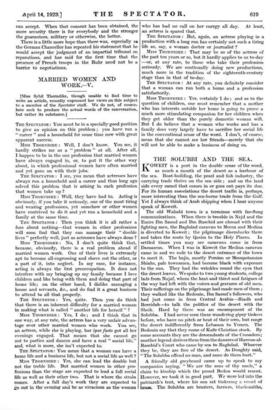MARRIED WOMEN AND WORK.---V.
[Miss Sybil Thorndike, though unable to find time to write an article, recently expressed her views on this subject to a member of the Spectator staff. We do not, of course, here seek to produce the actual words of the conversation, but rather its substance.] THE SPECTATOR : Yon-must be in a- specially good position to give an- opinion on this problem ; you have run a career " and a household for some time now with great apparent success: ' Miss- THORNDIKE Well, I don't know. You see, it hardly strikes me as a " problem " at all. After all, I happen to be in the one profession that married women have always engaged in, or, to put it the other way about, in which professional women have often married and yet gone on with their jobs; THE SPECTATOR : I see, you mean that actresses have always run a household and a career and thus long ago solved this problem that is- arising in each profession that women take up ?
Miss Tnoramirg : Well, they have had to. Acting is obviously, if you take it seriously, one of the most tiring and wearing professions, yet - somehow or other women have contrived to deo it and yet run a household and a family at the same time.
THE' SPECTATOR.: Then you think it is all: rather a fuss about nothing—that women in other professions will soon find that they can manage their " double lives " perfectly well, just as actresses have always. done ?
Miss THORNDIKE : No, I don't quite think that, because, obviously, there is a real problem ahead if married women work. One of their lives is- extremely apt to become all-engrossing and shove out the other, or a part of it, into neglect. In my case, for instance, acting is always the first preoccupation. It does not interfere with my bringing up my family because I love children and like being with them and doing that part of home life; on the other hand, I dislike managing a house and servants, &c., and do find it a great business to attend tat all that properly.
THE SPECTATOR : Yes, quite. Then you do- think that there is an inherent difficulty for a married woman in making what is called " another life for herself " ?
Miss THORNDIKE : Yes, I do ; and I think that in one way, at any rate, the actress has a very unfair advan- tage over other married women, who work. You see, an actress, while she is playing, has ipso facto- got all her evenings engaged. That means that she cannot go out to parties _and dances and have a real " social life," and, what is more, she isn't expected to.
THE-SPECTATOR: You- mean that a woman can have a home life and a business life, but not a social life as vrell ?
Miss Trion-No= : Yes, she can lead the double- but not the- treble life. But married women in- other pro- fessions than the stage are expected to lead a full social life as well as their other two. That is where the strain tomes. After a full day's work they are expected to to out-in the evening and 'be as vivacious as the woman who has had no call on her' energy- all day. At least, Tan actress is spared that. ' THE SPECTATOR': But, again, an actress playing in a production with a long run has certainly not such a tiring life as, say, a woman doctor or journalist t Miss Toomsrois.E : That may be so- of the actress of the- past ten years or so, but it hardly applies to us-to-day —or, at any rate; to those who take their profession -seriously. We- are- continually doing new productions, much more in the tradition of the eighteenthLcentury stage than in that of to=day.
THE SPECTATOR : At any rate, you definitely consider that a woman can run both a home- and a- profession satisfactorily.
Miss, THORNDIKE : Yes, certainly I do; and as- to the question of children, one must remember that a mother who has interests outside her home is going to prove a much more stimulating companion for her children when they get older than the purely domestic woman will. But Ii do believe that a woman who works• and has a family does very largely have to sacrifice her social life in the conventional sense of the word. I don't, of course, mean that she cannot see her friends—merely that she will not be able to- make a business- of doing so,










































 Previous page
Previous page